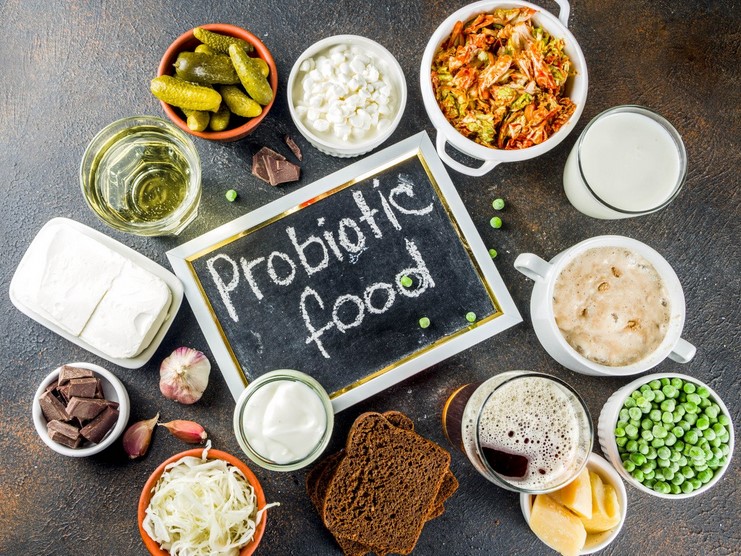
External help for our health
With the stressful rhythms of modern times, needing external help to find our balance is increasingly common. Probiotics are live microorganisms, such as bacteria or yeasts, that have beneficial effects on the health of the host when taken in adequate amounts. These organisms are naturally present in our gastrointestinal tract and other environments, such as the mouth, skin, and genitourinary tract. However, due to factors such as diet, stress, antibiotics, and other medications, probiotic levels can be reduced, which can have adverse health consequences.
Table of Contents
What are probiotics and how do they work
The use of probiotics as dietary supplements has become increasingly popular in recent years for the prevention and treatment of various conditions. Probiotics can be added to foods such as yogurt, kefir, and kimchi, or they can be taken as tablets, capsules, or powders.

Probiotics exert their beneficial effects through several mechanisms. First, they compete with harmful bacteria for the same nutrients and spaces in the gut, thereby reducing their growth. Second, they can produce short-chain fatty acids and bacteriocins, which can have antimicrobial effects against pathogenic bacteria. Furthermore, probiotics can modulate the host’s immune response, improving its ability to defend against infection.
Among the conditions for which probiotics have been studied are irritable bowel syndrome, ulcerative colitis, Crohn’s disease, antibiotic-associated diarrhea, and bacterial vaginosis. In particular, probiotics help relieve antibiotic-associated diarrhea symptoms, as these drugs can destroy harmful and beneficial bacteria in the gut, leading to dysbiosis. Additionally, probiotics may help restore intestinal flora after inflammation or infection.
However, not all probiotics are created equal or effective for all conditions. The effectiveness of probiotics depends on their species, strain, and dose, as well as the specific condition for which they are being used. Furthermore, the composition of the intestinal flora is highly variable between individuals and can be influenced by many factors, such as diet, lifestyle, and age. Therefore, no “one size fits all” of probiotics can be recommended for everyone.

Finally, it is important to note that probiotics are not a panacea and should not be used as a substitute for a balanced diet and healthy lifestyle. Also, probiotics are not recommended for people with compromised immune systems or for people who are seriously ill. Before using probiotics, it is important to consult your doctor or dietician to determine
Probiotics and food supplements: the differences
Probiotics are a dietary supplement, but not all dietary supplements are probiotics. Dietary supplements are products that contain nutrients or other substances that are intended to supplement the diet and provide health benefits. Dietary supplements can include vitamins, minerals, amino acids, herbs, enzymes, and other compounds.
Probiotics, as we have seen, are a specific dietary supplement containing live microorganisms that benefit the host’s health when taken in adequate amounts. On the other hand, dietary supplements can contain various substances but not live microorganisms.

Furthermore, dietary supplements can have a wide range of goals and modes of action. For example, vitamin supplements can help fill any gaps in your diet, mineral supplements can help prevent nutrient deficiencies, and herbal supplements can benefit specific symptoms or conditions.
On the other hand, probiotics are specifically aimed at restoring or maintaining the balance of the intestinal flora, which we have seen to be important for the organism’s overall health. Probiotics have been shown to benefit gastrointestinal health, such as reducing antibiotic-associated diarrhea and preventing ulcerative colitis. Some studies have suggested that probiotics may benefit other body parts, such as the skin and the immune system.
What to use between probiotics and supplements
It is impossible to say whether probiotics or dietary supplements are better overall, as it depends on each person’s needs and the specific goals they want to achieve.
Probiotics are particularly useful for restoring or maintaining the balance of the intestinal flora. Dietary supplements, on the other hand, can help fill any gaps in the diet and provide nutrients that are important for the general well-being of the organism.
Probiotics may be your best bet if you have a gastrointestinal issue, such as antibiotic-associated diarrhea or irritable bowel syndrome. Similarly, a specific dietary supplement may be the best choice if you are deficient in a particular nutrient, such as vitamin D.
Generally, choosing high-quality products tested for efficacy and safety is important. Before taking any supplement, it’s always best to talk to a doctor or nutritionist to ensure it’s appropriate for your needs and avoid interactions with other medications or pre-existing health issues.




